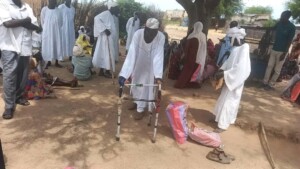Four die from cholera, dozens of new cases in Sudan’s White Nile
Four people died from cholera on Thursday and Friday, and dozens of new cases were recorded in White Nile state, while the Sudanese government remains silent.
“The situation is getting out of control, as the number of people infected is rapidly increasing in the areas of El Gezira Aba, Kosti, and Rabak,” Abdelrahman El Siddig, the head of the White Nile civil society organisations, told Radio Dabanga on Friday.
“Four people died, two of them in El Kawahla in El Gezira Aba on Thursday, and two others in Taksaboun on Friday. Dozens of new cases were recorded in El Kareida, El Kuwa, and El Marabee,” he reported.
Four people died from cholera on Thursday and Friday, and dozens of new cases were recorded in White Nile state, while the Sudanese government remains silent.
“The situation is getting out of control, as the number of people infected is rapidly increasing in the areas of El Gezira Aba, Kosti, and Rabak,” Abdelrahman El Siddig, the head of the White Nile civil society organisations, told Radio Dabanga on Friday.
“Four people died, two of them in El Kawahla in El Gezira Aba on Thursday, and two others in Taksaboun on Friday. Dozens of new cases were recorded in El Kareida, El Kuwa, and El Marabee,” he reported.
The hospitals in southern White Nile state are overcrowded with cholera patients, which prompted the health authorities to make use of schools and other facilities to treat the people. In cholera-stricken Rabak, the Maaz Bin Jebel School has been transformed into a makeshift-clinic.
“Many people now stay at home and do not commute between the villages or the towns in the area, in fear of further spreading the disease,” El Siddig said. “They are well aware of the dangers of the epidemic. The population of Block 17 in Rabak, where the Maaz Bin Jebel School is located, protested the arrival of patients for fear of transmission of infection.”
He strongly criticised “the slowness of the authorities in combating the epidemic. We are waiting for more medical teams and medicines to arrive to the afflicted areas”.
Thirst
El Siddig added that the authorities are cutting the water supply in cholera infected areas. “They fear the water will spread the disease even more,” the civil society activist explained. “On Friday, the water provision was cut off from Block 17 in Rabak, exacerbating the suffering of the inhabitants of the area.”
He also pointed to pollution of the water of the White Nile with effluent from the Asalaya and Kenana sugar factories.
Cholera
In September last year, Radio Dabanga received reports about people stricken by “acute watery diarrhoea” in Blue Nile state.
The Sudanese Health Ministry reported cases in Blue Nile and Kassala in southern and eastern Sudan and River Nile state in northern Sudan in the same month. The first samples of patients were examined for cholera as well.
Since then the deadly disease spread to other localities in eastern, central, and northern Sudan. In March and April, almost all reports about cholera came from El Gedaref in eastern Sudan.
The federal health authorities continue to deny the presence of cholera. The Health Ministry acknowledged a “watery diarrhoea epidemic” in eastern Sudan and Khartoum early this year. It reported in late January that more than 300 patients were recorded in El Gedaref, Red Sea, and Khartoum states, but did not announce clear measures to contain the disease. In early May, the Sudanese Health Minister, Bahar Abu Garda, announced a drop in the number of cholera cases in White Nile state, following chlorination of the drinking water.
“It [cholera] seems a stigma for the government. However raising the awareness among communities about preventing cholera is crucial to containing a cholera outbreak,” a UK-based Sudanese specialist told Radio Dabanga in January. He said he fears that the current situation will turn into a long-lasting outbreak.











 and then
and then